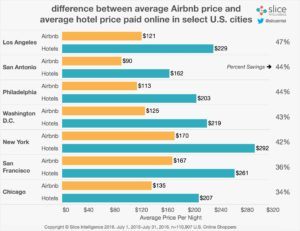Airbnb: My host wants to be my roommate. What does this mean?

What better way to live like a local than to live with one?
91% of travelers want to “live like a local”[1]. These travelers have a goal of feeling a strong sense of connection to the city they are exploring. They want to immerse themselves into a culture in a way staying at a hotel will not allow them to. Travelers choose to book accommodations with Airbnb because it allows them to feel immersed in a city as if they are locals, getting the raw experience of what it would be like to live there. For example, if you chose not to stay in an Airbnb in South Korea, you may not know that most apartments use codes, rather than keys, to allow you to enter the apartment. It is examples like this where unique cultural experiences can be missed by staying at your preferred SPG or Marriott (now one in the same) hotel.
What does Airbnb do? Airbnb, founded in 2008, allows those looking for a play to stay to rent accommodation space[2]. Airbnb is a peer-to-peer platform, for which it receives revenues through the transactions processed on this platform. Airbnb receives revenues by charging guests 9 – 12% service fee for their reservation and charging hosts 3% service fee to cover the cost of the transaction[3]. By the end of 2015, Airbnb had about 7 to 8 million guests, and was valued at over $10 billion[4].
Millennials are driving Airbnb’s popularity. In the past year, millennials accounted for about 50% of Airbnb patrons, compared to 28% of those who booked using Marriott[5]. The accommodation preferences of millennials are particularly important to the travel industry since millennials have indicated a stronger desire to travel internationally than any other generation by a 23% margin[6]. Further, for the US, millennials are expected to account for $855 billion of the travel and tourism industry.
It has been estimated that hotels lose approximately $450 million in direct revenues to Airbnb[8]. One reason this decline is expected to continue due to the “repeat purchase” factor of the Airbnb consumer base. Those that book a stay with Airbnb are 22% likely to book another Airbnb stay; and, those that have booked five Airbnb stays are over 50% likely to book another Airbnb stay[9]. With Airbnb’s growth and popularity, the traditional players in the hotel industry are starting to lose traction.
But the traditional hotel industry includes one fundamental offering that Airbnb is missing – the concierge service, which can be a quick win for Airbnb. For travelers who are not pros at google, yelp or any other app that helps you plan your vacation, the lack of an Airbnb concierge service can be a problem and an inhibitor to deciding to book with Airbnb. Also, a concierge service can be beneficial for guests who are travelling for a short time span and do not have ample time to plan their itinerary in advance.
Airbnb can offer this concierge service by allowing the Airbnb host to stay with the guest during the rental time period. Not in the same room of course (that would be awkward), but in the same building or house, with the host signing up to be your personal tour guide. Already, about 81% of hosts share the home in which they live[10]. Further, in the past year, those who stayed in an Airbnb spent about a quarter less per night than hotel guests[11]. This price gap is an opportunity for Airbnb hosts to charge an additional fee to be help their guests feel completely immersed in the culture. Who is a better person to tell you how to get to the nearest train, or what interesting local events are occurring that night than someone who actually lives there?
(754 words)
[1] Airbnb, “Economic Impact,” https://www.airbnb.com/economic-impact, accessed November 2016.
[2] Ahmed Mahmoud, “The Impact of AirBnb on Hotel and Hospitality Industry,” HospitalityNet, March 7, 2016, [http://www.hospitalitynet.org/news/4074708.html], accessed November 2016.
[3] Ibid.
[4] Ibid.
[5] Jack Beckwith, “Airbnb revenues up 89 percent, driven by Millennials,” Slice Intelligence (blog), August 29, 2016, [https://intelligence.slice.com/airbnb-revenues-89-percent-driven-millennials/], accessed November 2016.
[6] Marissa Gluck, “What Matters Now: Travel.,” Huge, July 12, 2013, [http://www.hugeinc.com/ideas/report/what-matters-now-travel], accessed November 2016.
[7] Source: Ebay, “Digital Door Lock Electronic keyless Keypad Mounted Milre Force MI-6300D Silver,” [http://www.ebay.com/itm/like/221526837578?lpid=82&chn=ps&ul_noapp=true], accessed November 2016.
[8] Ahmed Mahmoud, “The Impact of AirBnb on Hotel and Hospitality Industry,” HospitalityNet, March 7, 2016, [http://www.hospitalitynet.org/news/4074708.html], accessed November 2016.
[9] Robert Moore, “Airbnb Data Analysis: 6 Million Users by Year-End, Only 20% Active,” RJ Metrics (blog), April 27, 2012, [https://blog.rjmetrics.com/2012/04/27/airbnb-data-analysis-6-million-users-by-year-end-only-20-active/], accessed November 2016.
[10] Airbnb, “Economic Impact,” https://www.airbnb.com/economic-impact, accessed November 2016.
[11] Jack Beckwith, “Airbnb revenues up 89 percent, driven by Millennials,” Slice Intelligence (blog), August 29, 2016, [https://intelligence.slice.com/airbnb-revenues-89-percent-driven-millennials/], accessed November 2016.
[12] Ibid.





I recently went to Austin and stayed in an amazing Airbnb, and it would have been great to have some sort of concierge service to help me get fully immersed in the culture. However, I think Airbnb’s competitive advantage is that they ARE 1/4 less than hotels on average. To me, an Airbnb is a cheaper alternative to a hotel. If Airbnb were to offer a concierge service, I think that would have to be baked into the existing price and not added on. Perhaps one way to solve this is to offer a similar “TravelGuide” experience through their app but curated by the Airbnb hosts rather than the actual company. In my experience, my hosts have always been eager to share their favorite brunch spots nearby, so I can’t see them being resistant to this type of content creation.
Thanks for the post – Airbnb is certainly an interesting company that is has disrupted the hospitality industry. While I can certainly see the appeal of augmenting concierge service offerings, I’m not sure having the host stay is the best idea. At most Airbnbs I’ve stayed at across the world, the hosts already send/leave you transport instructions, local attraction information, discount coupons, restaurant recommendations, and tour company contact details. They also tend to leave their phone numbers and are happy to answer questions should you have them. This makes me wonder how much your proposal would add to the experience. One of the more appealing selling points of Airbnbs also seems to be the ability to book a whole home for your group, so I’m wondering how customers would react to the loss of privacy associated with having the host stay at the same time as you (same building, different apartment might correct for this). My last concern would be the price: I’m curious as to how much of consumers’ decision to stay at an Airbnb is driven by its currently cheaper price, and consequently how that decision might change if the prices increased as per your suggestion? Maybe having the option of adding a few short tours with your host is another option to consider?
Great read! I love AirBnB and have used it a number of times, but I am cognizant that there has been considerable criticism of the company and its model. How would you respond to critics who say that AirBnb is causing rents to spiral in certain areas as ‘entrepreneurs’ rent out apartments solely as AirBnB spaces and can thus afford to pay higher leases than many locals looking to live in the area? It seems that AirBnB intended for the service to provide this immersive experience of staying in someone’s actual apartment or spare room but quickly many of the listed properties have essentially become AirBnB hotels. And it’s not simply a matter of AirBnB driving up rents – as someone who lived in a building where a unit was converted to an AirBnB flat, guests tend not to always be on their best behavior. How do you think AirBnb can step in to ensure that negative externalities are not borne by locals?
Thanks for the post CB! I’m intrigued by your Airbnb concierge suggestion, and I think that it is definitely something that Airbnb could start piloting. My only hesitation would be that I think Airbnb should do some preliminary market research before pulling the trigger on the added service. There are without a question Airbnb customers who would welcome this added service and be willing to pay for it. However, I think there are also a number of customers who enjoy the anonymity and independence that the Airbnb affords them. Folks traveling are doing so for different reasons — vacation, work, visiting family, etc. For the Airbnb customers traveling for work or visiting family, this concierge service would be unnecessary or even a nuisance. On the other hand, it could provide some true value for customers traveling for vacation, particularly for customers never having been to the city/country that they are visiting. Airbnb could potentially have customers booking select the reason they are traveling (vacation, work, visiting friends/family, etc.), and indicate whether it’s the first time they have been in the location. Airbnb could then target these concierge services to customers who would find value in it. I’m thinking that the concierge services would have to be an opt-in program for renters, but could also potentially be localized for particular renters interested in offering guide experiences to customers in the area.
Thanks for the interesting read! Clearly, Airbnb is looking to improve its product offering and attempt to steal more traditional hotel customers. I think the concierge service is an interesting approach to this, but I strongly believe there are some additional offerings that Airbnb should invest in that will complement the concierge service. One of the key perks that drives a business traveler’s decision to stay in a hotel versus an Airbnb, for example, is the loyalty program (points). As such, I think Airbnb would benefit from creating a dynamic loyalty program, rewarding guests with free nights and status benefits. Perhaps Airbnb could partner up with an airline or even a rental car company to facilitate the earning and transferring of rewards.
With regards to the concierge service is there an opportunity to offer a digital, centralized solution instead of just relying on the host? There appears to already be a significant amount of substitute products. With the apps like Yelp, Tripadvisor, etc., travelers have become quite resourceful. How does this limit the potential benefits of concierge services and perhaps suggest that Airbnb focus its efforts elsewhere? Similarly, there is also an interesting startup called BnbSitter that offers on-demand concierge services as well as housekeeping and check-in and check-out services. Are Airbnb’s efforts here just overkill?
References:
https://www.tnooz.com/article/startup-pitch-bnbsitter-a-concierge-service-for-airbnb-hosts-leads-in-paris/